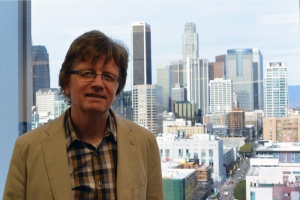Visiting Scholar Brings International Focus to Military Transition Issues
February 04, 2016 / by Claudia Bustamante- Research
Struggling to translate military skillsets for the civilian workplace and developing an identity outside the military are not transitional challenges unique to American veterans.
In an exchange of ideas that could promote the well-being of all veterans—regardless of nationality—David Pedlar, research director at Veterans Affairs Canada, joined the USC School of Social Work as a Fulbright visiting research chair in military social work.
Pedlar’s semester-long appointment with the school’s Center for Innovation and Research on Veterans & Military Families will focus on conducting research and gathering best practices on improving transition from military service to civilian life for veterans. He will also be guest lecturing for some Master of Social Work military option classes, as well as working with the USC Price School of Public Policy.
As the home to the most number of veterans, Los Angeles County offers a unique perspective for Pedlar to study the issues facing local veterans. But he will also tap into CIR’s role as a global convener to gather international expertise on military transition issues that can help Canadian veterans.
“There is intense interest in Canada, the United States and other countries on the best ways to facilitate the smooth transition from military life with optimal outcomes,” Pedlar said. “The context is different, but the challenges are similar.”
Some of the universal themes of transition are developing a civilian identity and a sense of purpose outside the military, adapting psychologically to the new environment, finding meaningful employment, and securing housing.
The United States has more than 22 million veterans, with about 1.8 million residing in California. By contrast, Canada has about 700,000 veterans.
In Los Angeles with a high concentration of veterans, a collective-impact approach, like the Los Angeles Veterans Collaborative, is successful because it harnesses the combined efforts of numerous organizations. The same model might not work in Canada, where there are relatively low concentrations of veterans; nonetheless, key elements could inform policy makers.
Getting ‘transition’ right is of paramount importance since a growing body of research has found that the first few years after separating from the military are critical to a veteran’s overall well-being.
“If you get transition right, then you’re probably solving a lot of problems that could arise later in life,” Pedlar said.
To that end, Pedlar, along with Carl Castro, assistant professor and director of CIR, and Alice Aiken, scientific director of the Canadian Institute for Military and Veteran Health Research, will convene an international expert panel at USC to discuss military-to-civilian transition.
Researchers from across the United States, Canada, the United Kingdom, Australia and New Zealand have been invited to identify the key elements of transition and to help develop publications that will serve as a basis for future study, programs and policy.
“Even though this is an area of intense interest, right now there is no synthesis of current knowledge on this topic, nor is there a consensus model on what the essential elements of transition are and how best to achieve them,” Pedlar said.
To reference the work of our faculty online, we ask that you directly quote their work where possible and attribute it to "FACULTY NAME, a professor in the USC Suzanne Dworak-Peck School of Social Work” (LINK: https://dworakpeck.usc.edu)
